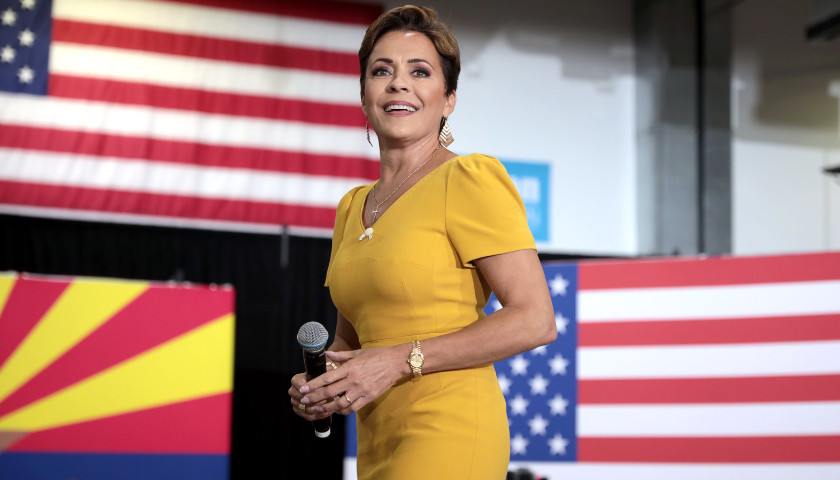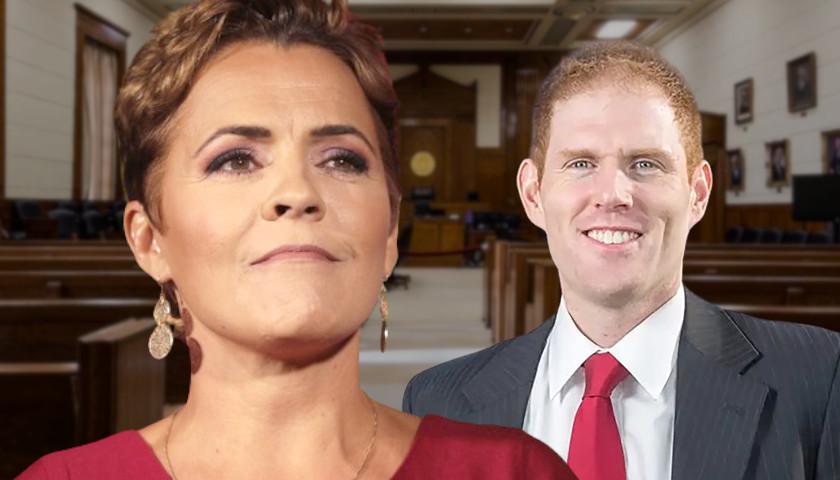A trial began on Thursday over a lawsuit Kari Lake filed against Maricopa County objecting to its refusal to allow her to use public records law to inspect ballot affidavits, which are signatures from voters on the mail-in envelopes for their ballots. A significant portion of Lake’s ongoing election lawsuit alleges that ballots were counted without adequate signature verification. Much of the testimony consisted of going over other ways signatures are public, such as on recorded deeds.
Maricopa County Superior Court Judge Hannah, who was appointed to the bench by Democratic Governor Janet Napolitano, refused to allow any of Lake’s three proposed witnesses to testify. Deputy County Attorney Jack O’Connor said they “will bring up falsehoods.” He added, “It’s a low bar for relevant evidence, but they don’t even pass that bar.”
Hannah dismissed Shelby Busch, co-founder of We the People AZ Alliance, which has conducted extensive investigations into the 2020 and 2022 election problems. She presented testimony about its findings to the Arizona Legislature. He described her as a “medical office manager” who is “so obviously unqualified” and “not even in the ballpark,” so her testimony is “irrelevant.”
Hannah said he “wasn’t sure” how Chris Hansel, who worked on the Arizona Senate’s independent ballot audit of the 2020 election, was relevant. Lake’s attorney, Bryan Blehm, asked if he could testify as a lay witness, but Hannah refused. He did not indicate why he would not allow Erich Speckin of Speckin Forensics to testify. Speckin, whose expertise is in document examination and handwriting analysis, testified during Lake’s second election contest trial that signatures were reviewed so quickly they could not have been adequately compared.
Hannah refused to admit multiple exhibits submitted by Lake’s team, claiming they weren’t relevant. He frequently cut Blehm off during his questioning, stating that the subject matter was irrelevant.
Hannah cited Berry v. Department of Corrections, a case decided by the Arizona Court of Appeals, which held that the prison warden has significant discretion in determining “prison authorities’ obligation to assist inmates’ efforts to obtain appropriate access to legal materials and assistance.” Hannah said there is a presumption of disclosure in the law, and the state’s best interest must be taken into account. However, a couple of times during the trial, Hannah said he wasn’t sure whether the burden should be on Lake or the county to show this. He settled on the county.
Since Hannah wasn’t very sure who had the burden, he hesitated in choosing which party to go first. Blehm helpfully pointed out that since Hannah refused to allow any of his witnesses to testify, he didn’t have any testimony to put on.
During his presentation, Blehm said the dispute should be decided with a balancing test.
“It is in the best interest of the state and the people to understand what’s taking place in their elections,” he said. “People have a right to know. And then the legislature will know what to change.”
He said voters waived any right to confidentiality by publicizing their signatures when they dropped the envelopes in the mail. He listed various ways people sign their names, which “goes into stream of commerce,” such as signing a credit card receipt at a restaurant, signing high school annuals, and signing pleadings.
The county objected to releasing the signatures based on A.R.S. 16-168(F), which states that certain parts of voter registration records are not releasable to the public, including signatures. Blehm noted that the statute has exceptions, including for the media and “for election purposes.”
O’Connor called Maricopa County Recorder Stephen Richer to the witness stand and asked him about signature verification procedures. Richer said in the 2022 general election, 16,000 signatures needed curing, all of which were successfully cured except 1,800. He said in 2018 or 2019, the Arizona Legislature changed the law regarding signature verification, stating that the ballot affidavits must be compared to the “voter registration record” instead of the “voter registration form.” He said that was also adopted in the state’s Election Procedures Manual (EPM).
Richer discussed how he and several other county recorders in the state started comparing the ballot affidavit signatures to previous affidavit signatures, not just the original signature when the voter first registered. He acknowledged that the practice was dealt a blow recently when Yavapai County Superior Court Judge John Napper refused to grant a motion to dismiss a lawsuit challenging the new practice. Napper said that the EPM creates a process that “contradicts the plain language” of state law by allowing signature matching with documents that have “nothing to do with the act of registering.”
Next, Richer discussed threats he received relating to elections. He did not explain how this was relevant to the dispute about not releasing ballot affidavits. He claimed that if they were released, it could have a “chilling effect” on voting.
When challenged by Blehm, Richer admitted, “Voter registration is a public record.” A.R.S. 16-161(A) provides, “When the registration form is filled out, signed by the elector and received by the county recorder, it shall constitute an official public record of the registration of the elector.”
Richer said when his office receives public records requests for voter registration cards, they turn them over but redact their email address, the last four digits of their Social Security number on file, and their signature.
Blehm pointed out that their signature is not redacted when someone records a document with the recorder. Richer complained that if he is required to provide the signatures to Lake, then others would request them, and it would consume significant resources.
Blehm asked him if he produced the VM34 file when people requested it. He said the file includes the voter’s registration number, name, and address but not their signature or email address. Richer responded yes.
The county produced three witnesses. The first, Katherine Sigmon, testified about how some canvassers stopped by her house after the election to ask if she had received any ballots in the mail that were not addressed to her. She said she followed them after they left to ask them further questions. She discovered they were part of an effort by Liz Harris and Jim Lamon and said it made her angry that someone was asking her about her “voting process and voting envelope.”
Blehm asked her if she thought canvassing was acceptable. “I think everything associated with the voting process should be private,” she asserted. She said she associated canvassing with work prior to an election, not afterward.
Next, the county called Francisco Polanco to the stand, a partner with the progressive lobbying firm Creosote Partners. He complained about members of his firm being harassed and doxxed, but it admitted the main cause of the harassment was representing LGBT causes, not election issues.
The county’s final witness was his partner at the firm, Marilyn Rodriguez. She discussed hostility she had experienced at the state Capitol when lobbying but did not tie it to any election-related work. She complained about people there displaying MAGA flags and openly carrying firearms, stating they targeted a progressive Latino group at the state Capitol “due to the color of their skin” and because they are pro-democracy.
The trial resumes on Monday at 9 a.m. with more witnesses from the county. It is live-streamed on the court’s website and by Real America’s Voice.
– – –
Rachel Alexander is a reporter at The Arizona Sun Times and The Star News Network. Follow Rachel on Twitter. Email tips to [email protected].
Photo “Kari Lake Trial” by RealAmericasVoice.





